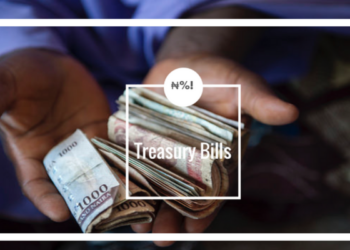Nairametrics| The Federal Government in March 2017 increased the minimum amount required to partake in its biweekly treasury bills auction from N10,000 to N50 million. This announcement means, retail investors can no longer participate in the primary market for treasury bills.
In place of treasury bills, the government introduced the FGN Savings bonds, which offers smaller investable sums but unfortunately does not offer the same lucrative yield as the Treasury Bills. The FGN Savings bond also has a longer tenor being that it is two years and three years, compared to treasury bills that has a maximum tenor of 364 days (one year).
FGN Savings, is also a bond and includes risk of being priced lower assuming you wish to invest in the short-term and sell before the tenor expires. Treasury bills are easier and a simpler form of investing, thus its popularity.
We explained the difference between the FGN Savings bond and treasury bills in the article.
With this new directive, most Nigerians without the financial muscle to invest in treasury bills, find themselves in a state of quagmire. But there is a way out.
How to invest
Fortunately, you can still afford investing in treasury bills if you do not have up to N50 million. This is because Banks have designed products that pool funds from customers, which they can then use to invest in treasury bills.
[Read more: Nigerian Treasury Bills: Learn everything about Tbills]
How it works
- Banks can pool small sums of money from their customers into a portfolio that is at least more than the minimum required N50 million.
- Funds are pooled in line with the tenors three months, nine months and one year respectively.
- The funds once pooled are invested under a collective fund, owned by the banks on behalf of investors in the pool.
- They then apply to bid for treasury bills through the Central Bank of Nigeria.
- Interest earned from the fund is shared equally to all fund contributors based on their individual contributions.
- For example, if you invested N100,000 in a pool that invested in a 364 day treasury bill that pays 18% interest rate, the bank will pay you N18,000 as your gross interest earned. If your friend also invested in that same pool, but invested N2 million, your friend will get N260,000.
- Banks will typically charge a fee for this service. The amount charged ranges from bank to bank, so you will have to confirm with your bank what the fee is.
[Read Also: How to choose between investing in bond funds, money market funds or savings bonds]
How do I apply
- Approach your bank and ask to invest in treasury bills using the pool option
- They will give you a form and you will fill the amount that you wish to invest.
- You will also indicate whether you want to buy in the primary or secondary market. They work differently (see explanation below)
- You will give the bank an authority to debit your account and give the bank fiduciary responsibility invest the fund on your behalf
- Once done, you submit the form and await a debit alert
- The next alert you will receive will be a credit alert. If your investment was successful (that is, your pool qualified for subscription via the CBN), you will get an alert of the interest payment. This usually occurs within 3 days of the conclusion of the bid.
- If your bid was unsuccessful, you will also receive an alert, this time with the full amount invested net any fees or charges from the bank. You will not get interest because your pool’s subscription was unsuccessful.
Primary bid
- Primary bids occur when the bank includes your investment in a pool that is buying treasury bills directly from the CBN.
- In a primary bid, you buy directly from the CBN via your bank’s pool, for a 91 days, 182 days or 364 days auction.
- If you decide not to hold to maturity, you can sell your right in the pool to another investor.
- However, you forfeit interest not earned to your buyer.
Secondary bid
- You can also invest in treasury bills by buying from the bank or someone in a pool who is not willing to stay through the end of the tenor of an auction.
- In this bid, you can get between 90 days and 364 days. It can be 60 days, 75 days, 107 days etc. Just whatever is left of the tenor in the pool you bought into.
- Banks keep records of all buyers, so they are good at working these things out.
- You can also sell, if you do not want to wait out the investment.
[Read Also: Official: Nigerian Treasury bills calendar for September – November 2019]






















I would like to know how interest rates are computed. Assuming one buys for 3 or 6 months tenor, how does the one year interest rate apply? Will it be the same amount for 3, 6, 9 & 12 months temors or the interest for one year has to be pro rated to the number of months?
Assuming Treasury bill is bought via secondary mkt will interest be the same?
Most commercial banks keep customers fund for too long before investing it in T.Bills. The story is that they bid but did not scale through. They earn float income on the funds.
Honestly I appreciate you works and comments both online and on radio.
Cheers
what happens to my T-Bills investment if the commercial bank that helped purchased from secondary market collapsed
can I apply with 100k
Some banks do accept N100,000 as the minimum for their pooling system for Treasury Bills, so, that is a YES!
If Iinstructed an Investment Manager which is not a commercial bank to invest my money in treasury bill, how can I be sure that the firm truly invest my money in Treasury bill and not something else with high risk?
Can a #100,000 be used for my investment on T-bill?